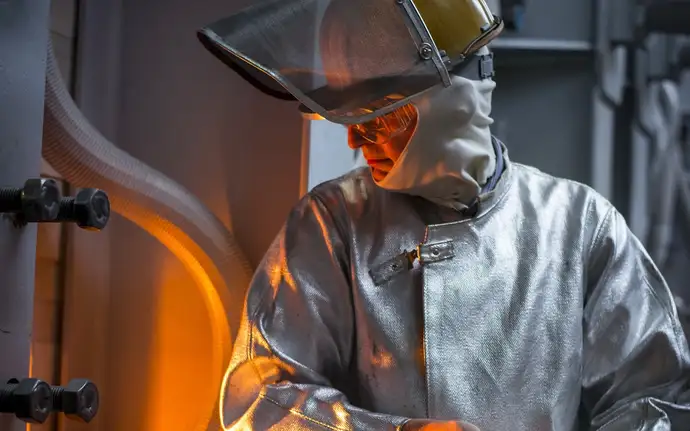Glass production without natural gas: Successful laboratory tests with 100 percent hydrogen
12 July 2023, Mainz, Germany
- Laboratory-scale melting tests under near-production conditions.
- Next step: tests with 100 percent hydrogen in a glass melting tank.
- Appeal to politicians: push for hydrogen infrastructure and availability and enforce climate protection agreements

Ambitious goal: climate-neutral glass production using green hydrogen.
Heating glass melting tanks with hydrogen is not a trivial task. Temperatures of up to 1,700 degrees Celsius must be maintained permanently during the melting process. Research into whether hydrogen can do this constantly and how its use affects the quality of the glass products is real pioneering work. The rewards of climate-neutral glass production would be great: Glass is widely used as a technical material – in household appliances, consumer electronics, semiconductors, and vehicles, as well as astronomy, aerospace, and aviation, for example. The CO2 emissions that are generated during energy-intensive glass manufacturing with natural gas and that could be avoided are high. SCHOTT is therefore aiming to become climate neutral in its production by 2030 (Scope 1&2 Greenhouse Gas Protocol).To achieve this goal, the Group acts according to the principle “Avoid – Reduce – Compensate.” The action plan comprises four areas of action: Technological change, expansion of energy efficiency, conversion to 100% green electricity and, as a final step, compensating any remaining emissions by engaging in high-quality climate protection projects. Against the backdrop of technological change, the company is focusing above all on the energy-intensive process of glass melting. Here, two paths are being pursued: the electrification of the melting tanks with green electricity and the use of green hydrogen instead of natural gas.
Challenges: the hydrogen infrastructure and green energy sources
Until now, SCHOTT has had to conduct its tests using gray hydrogen. Green hydrogen, produced from renewable energies, is not yet available in sufficient quantities. Two key factors are missing for this: an extensive infrastructure for (industrial) hydrogen supply and the expansion of renewable energies for the production of green electricity.“As a pioneer on using hydrogen in an energy-intensive industry, we urgently need to take further steps and come up with timely solutions for a functioning infrastructure,” said Dr. Jens Schulte, member of the SCHOTT Board of Management, in an appeal to the decision makers in the German government and German parliament. “The climate protection contracts planned by the German Federal Ministry of Economics and Climate Protection to promote climate-friendly production represent an important vehicle for keeping the participating industries competitive and enabling rapid implementation. We rely on the innovative strength and close cooperation with our partners as well as the federal states.”
Research funding projects: SCHOTT has been investigating possible hydrogen solutions since 2018.
The “H2 Industry – the Use of Hydrogen in Industrial Combustion Processes” project, in which SCHOTT tested the admixture of hydrogen in production at the site in Mainz in late 2022, is being funded by the European Regional Development Fund and the Rhineland-Palatinate Ministry for Climate Protection, Environment, Energy and Mobility. SCHOTT has also been active in other research funding projects for quite some time: The MiGWa project (Microwave Glass Hydrogen) runs from the beginning of 2021 until the end of 2023. It is funded by the German Federal Ministry of Education and Research and the European Union and is aimed at reducing fuel gas in the glass manufacturing process by using hydrogen or microwaves. And in the Copernicus P2X projects, SCHOTT tested the use of 100 percent hydrogen in the glass melt for the first time as early as 2020.Further information on environmental and climate protection at SCHOTT
For several years, SCHOTT has been testing how hydrogen can be successfully added to glass melting. Photo: SCHOTT
A look inside a melting tank: A lot of energy is needed to melt specialty glass. The temperatures reach up to 1,700° Celsius. Photo: SCHOTT
Pioneering. Responsibly. Together.
These attributes characterize SCHOTT as a manufacturer of high-tech materials based on specialty glass. Founder Otto Schott is considered its inventor and became the pioneer of an entire industry. Always opening up new markets and applications with a pioneering spirit and passion – this is what has driven the #glasslovers at SCHOTT for almost 140 years. Represented in over 30 countries, the company is a highly skilled partner for high-tech industries: Healthcare, Home Appliances & Living, Consumer Electronics, Semiconductors & Datacom, Optics, Industry & Energy, Automotive, Astronomy & Aerospace. In the fiscal year 2022, its 17,200 employees generated sales of 2.8 billion euros. SCHOTT AG is owned by the Carl Zeiss Foundation, one of the oldest foundations in Germany. It uses the Group's dividends to promote science. As a foundation company, SCHOTT has anchored responsibility for employees, society and the environment deeply in its DNA. The goal is to become a climate-neutral company by 2030.
Jonas Spitra
Head of Sustainability Communications

